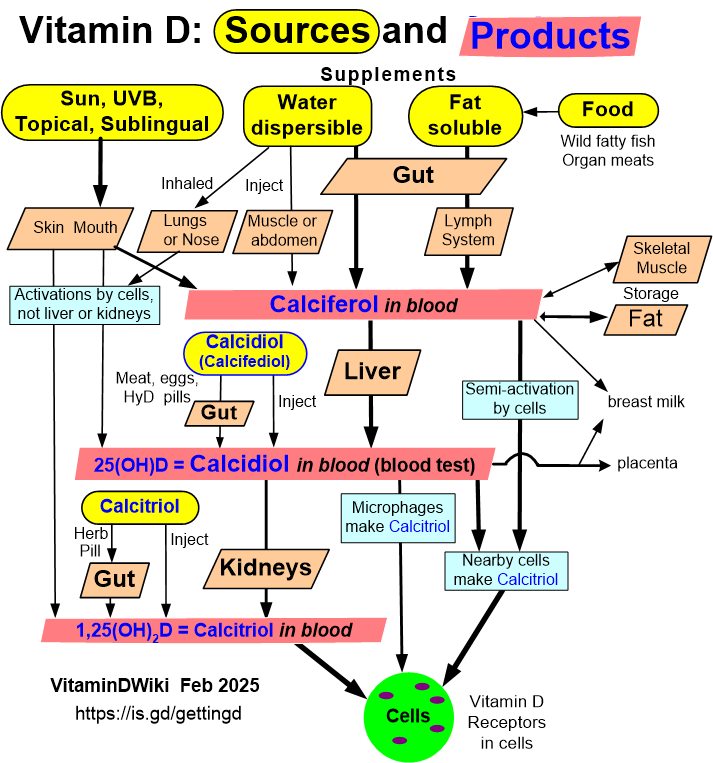Seniors get about 4X less vitamin D from the sun or UVB
Response by Perplexity AI - Feb 2024
Includes references, graphics, videos, etc.

Seniors synthesize less vitamin D from sun exposure due to several physiological and lifestyle factors. The primary reasons include:
Decreased Skin Efficiency: As people age, the levels of the substance in the skin (7-dehydrocholesterol) that UVB light converts into the vitamin D precursor decrease. This results in a 50% reduction in the formation of previtamin D3 in older individuals compared to younger ones 2 3
Renal Function Decline: Aging affects the formation of 1,25-dihydroxyvitamin D (calcitriol), the active form of vitamin D. There is a 50% reduction in the production of 1,25(OH)2D due to an age-related decline in renal function . Although serum 1,25(OH)2D levels are maintained in part by secondary hyperparathyroidism, the overall capacity to produce the active form of vitamin D diminishes with age 2
Lifestyle Factors: Older adults may engage in less outdoor physical activity, reducing their exposure to sunlight, which is necessary for the skin to produce vitamin D 4
Additionally, seniors might have dietary patterns that do not provide sufficient vitamin D 2
Obesity: Fat tissue absorbs vitamin D, and studies have shown that being obese is correlated with low vitamin D levels. Since the prevalence of obesity can increase with age, this can further contribute to lower vitamin D synthesis in seniors 3
Vitamin D Absorption and Metabolism: Conditions that affect the gut and digestion, such as celiac disease, chronic pancreatitis, Crohn's disease, and cystic fibrosis, can reduce vitamin D absorption. Moreover, some types of liver disease can reduce the absorption of vitamin D because the liver isn't producing normal amounts of bile, or essential steps in vitamin D metabolism can't occur or occur incompletely 3
Sunscreen and Clothing: While sunscreen use and clothing are important for preventing skin cancer, they can also reduce the skin's ability to produce vitamin D from sunlight. Although the impact of sunscreen on vitamin D levels might not be significant due to irregular use, it's a factor worth considering, especially for seniors who might be more cautious about sun exposure 3
- In summary, seniors synthesize less vitamin D from sun exposure due to a combination of physiological changes, such as decreased skin efficiency and renal function decline, as well as lifestyle factors like reduced outdoor activity and dietary intake. These challenges highlight the importance of monitoring vitamin D levels in the elderly and considering supplementation or dietary adjustments as necessary.
Note: Probably little reduced response in seniors with Topical Vitamin D
Topical Vitamin D category contains;
{include}
And, some topical Vitamin D does not use the Kidneys
Getting Vitamin D into your blood and cells has a chart:

13 reasons why many seniors need more vitamin D (both dose and level) - July 2023 has:
{include}
Vitamin D Life - studies in both categories Seniors and Noontime Sun
This list is automatically updated
{category}
Vitamin D Life - studies in both categories Seniors and UV
This list is automatically updated
{category}
